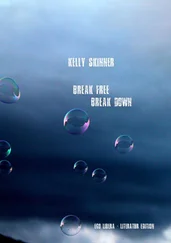Lydia Davis - Break It Down
Здесь есть возможность читать онлайн «Lydia Davis - Break It Down» весь текст электронной книги совершенно бесплатно (целиком полную версию без сокращений). В некоторых случаях можно слушать аудио, скачать через торрент в формате fb2 и присутствует краткое содержание. Город: New York, Год выпуска: 2011, Издательство: Farrar, Straus and Giroux, Жанр: Современная проза, на английском языке. Описание произведения, (предисловие) а так же отзывы посетителей доступны на портале библиотеки ЛибКат.
- Название:Break It Down
- Автор:
- Издательство:Farrar, Straus and Giroux
- Жанр:
- Год:2011
- Город:New York
- ISBN:нет данных
- Рейтинг книги:3 / 5. Голосов: 1
-
Избранное:Добавить в избранное
- Отзывы:
-
Ваша оценка:
- 60
- 1
- 2
- 3
- 4
- 5
Break It Down: краткое содержание, описание и аннотация
Предлагаем к чтению аннотацию, описание, краткое содержание или предисловие (зависит от того, что написал сам автор книги «Break It Down»). Если вы не нашли необходимую информацию о книге — напишите в комментариях, мы постараемся отыскать её.
is Davis at her best. In the words of Jonathan Franzen, she is “a magician of self-consciousness.”
Break It Down — читать онлайн бесплатно полную книгу (весь текст) целиком
Ниже представлен текст книги, разбитый по страницам. Система сохранения места последней прочитанной страницы, позволяет с удобством читать онлайн бесплатно книгу «Break It Down», без необходимости каждый раз заново искать на чём Вы остановились. Поставьте закладку, и сможете в любой момент перейти на страницу, на которой закончили чтение.
Интервал:
Закладка:
I was filled with rage. As though he were strolling around a zoo, this man had come up to my stony little pen and rudely examined me. I fumed and paced around the room. But I was lonely there, out in the country, and he had awakened my curiosity. By the time a few days had gone by, I was anxious to see him.
He came again, and this time he did not hesitate at the door, but walked in, sat down on a chair, and spoke to me. I did not understand his country accent. He repeated one phrase twice and then a third time and still I could only guess at his meaning. When I tried to answer him he had the same trouble understanding my city accent. I gave up and offered him a glass of wine. He refused it. In a diffident sort of way he got up from his chair and ventured to inspect my belongings at closer range. Proceeding from my bookcase around the walls, which were covered with framed prints of houses I particularly liked, some in the Place des Vosges and some in the poor quarters behind Montparnasse, he finally arrived at my drawing board, where he stopped short and stood with his finger in the air, waiting for enlightenment. The fact that I was planning a house, line by line, took him a long while to understand and when he did, he began tracing the walls of each room with his finger, a few inches above the blueprint. When at last he had examined and traced every line, he smiled at me without parting his lips, looking sideways in a rather sly way which I did not understand, and abruptly left me.
Again I was angry, feeling that he had invaded my room and stolen my secrets. Yet when my anger subsided I wanted him to return. He returned the following day, and a few days later he came yet again, though the wind was high. I began to expect him and look forward to his visits. He hunted every morning very early, and several times in the week, after he was finished, he would walk in from the field, where the sun was beginning to color the white clay. His face would gleam and he would be so full of energy that he could hardly contain it: leaping up every few minutes from his chair, he would pace to the door and look out, return to the middle of the room, whistling tunelessly, and sit down again. Slowly this energy would die away, and when it was gone, he would go too. He never accepted anything to eat or drink, and seemed surprised that I would offer it, as though sharing food and drink were an act of great intimacy.
It did not become any easier for us to communicate, but we found more and more things to do together. He helped me prepare for winter by filling the chinks in my walls and stacking wood for the fireplace. After we had worked, we would go out into the fields and the forest. My friend showed me the places he liked to visit — a grove of hawthorns, a rabbit warren, and a cave in the hillside — and though I had only one thing that I could show him, he seemed to find it just as mysterious and absorbing as I did.
Each time he came to see me, we would first go over to my blueprint, where I had added another room or increased the size of my study. There were always changes to show him, because I was never done improving my plan and worked on it almost every hour. Sometimes, now, he would pick up my pencil and awkwardly sketch in something that would not have occurred to me: a smokehouse or a root cellar.
But the excitement of the plan as well as the pleasure of having a friend were blinding me to a dreadful fact: the longer I lived on my land, letting the time slip by, the more the possibility of building the house faded. My money was trickling away and my dream was going with it. In the village, far from any marketplace, the price of food was double what it had been in the city. Thin as I was, I could not eat any less. Good masons and carpenters, even poor ones, were rare and expensive here: to hire a pair of them for a few months would leave me too little to live on afterwards. I did not give up when I learned this, but I had no answers to the questions that plagued me.
In the beginning, my blueprint had absorbed all my time and attention because I was going to build the house from it. Gradually, the blueprint became more vivid to me than the actual house: in my imagination, I spent more and more time among the penciled lines that shifted at my will. Yet if I had openly admitted that there was no longer any possibility of building this house, the blueprint would have lost its meaning. So I continued to believe in the house, while all the time the possibility of building it eroded steadily from under my belief.
What made the situation all the more frustrating was that on the outskirts of the village new houses were springing up every few months. When I had bought the land, the only structures in the valley were stone field huts — squatting in the middle of each plowed field, they were as black as caves inside, with floors of earth. After signing the deed, I had returned home and stood, well satisfied, looking across the acres of abandoned vineyards and overgrown farmland to the horizon where the village sat piled up on a small hill, like a castle, with its church steeples clustered at the top. Now, here and there on the landscape, there was a wound of raw red earth and in a few weeks a new house would rise like a scab above it. There was no time for the landscape to absorb these changes: hardly had one house been finished before the live oaks were felled right and left for another.
I watched the progress of one house with particular horror and misgiving, because it was within a few minutes’ walk of my own. The deliberate speed with which it went up shook me and seemed a mockery of my own situation. It was an ugly house, with pink walls and cheap iron grillwork over the windows. Once it was finished, and the last young tree planted in the dust beside it, the owners drove up from the city and spent All Saints’ Day there, sitting on the terrace and looking out over the valley as though they had box seats at the opera. After that, as long as the weather held, they drove up to the house every weekend, filling the countryside with the noise of their radio. I watched them gloomily from my window.
The worst of it was that my friend immediately stopped visiting me on the weekends. I knew he had been drawn away from me by my neighbors. From a distance I saw him standing quietly among them in their yard. I felt utterly miserable. At last I had to admit how bleak my position was. It occurred to me then to sell my land and begin all over again somewhere else.
I thought I might get a good price for the land from other city people. But when I went to see the real estate agent, he told me flatly that because there was a sewage yard in the next field and because my house was uninhabitable, my property would be almost impossible to sell. He went on to say that the only people who might be interested in buying it were my neighbors, who had in fact resented my presence all this time and would give a very low sum for the land just to be rid of me. They had told the agent in confidence that my house was an eyesore in their front yard and an embarrassment when friends came to spend the day. I was shocked. My strongest feeling, of course, was that I would never sell to my neighbors. I would never give them that triumph. I turned my back on the agent and left without saying a word. As I stood deliberating on the doorstep, I heard him go into another room, say something to his wife, and laugh loudly. This was a very low point in my life.
When, after several weeks, my friend stopped coming altogether, without a word to explain his absence, my bitterness was complete. I sank into a deep depression and decided that I would give up the idea of building a house and return to my job in the city. The directors of my company had not been able to find anyone else willing to put up with the long hours and devote himself to such interminable complications. They had several times written asking me to return and offering me more money. I could easily slip back into my old way of life, I thought; this stay in the country would then have been a protracted holiday. I even managed to convice myself, for a moment, that I missed city life and my few acquaintances in the office, who used to buy me drinks after particularly tedious days. I told the agent to make an offer to my neighbors, and tried to think that I was doing the right thing. But my heart was not in the move, and I felt like a changed man as I packed up my belongings and took a last walk around my narrow boundaries.
Читать дальшеИнтервал:
Закладка:
Похожие книги на «Break It Down»
Представляем Вашему вниманию похожие книги на «Break It Down» списком для выбора. Мы отобрали схожую по названию и смыслу литературу в надежде предоставить читателям больше вариантов отыскать новые, интересные, ещё непрочитанные произведения.
Обсуждение, отзывы о книге «Break It Down» и просто собственные мнения читателей. Оставьте ваши комментарии, напишите, что Вы думаете о произведении, его смысле или главных героях. Укажите что конкретно понравилось, а что нет, и почему Вы так считаете.












